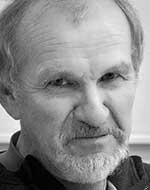Page Content
 I want that statement out, bold and confident. I want people who dislike the gay rights movement to pray for my soul. I want them to dig into the Bible or any other text and say how wrong I am.
I want that statement out, bold and confident. I want people who dislike the gay rights movement to pray for my soul. I want them to dig into the Bible or any other text and say how wrong I am.
I want them to say being gay is unnatural. I want them to think that I am responsible for the downfall of the family.
And how will I answer them?
With some evidence, and with the journey of my own straight life.
Forty-five years ago I was like most other men, joking about “homos” as often as we joked about women staying in the kitchen. And now, on a serene summer day, our band is playing for the local Pride festival in Lethbridge. Hundreds of people lingering, chatting, showing off rainbow colours and costumes, moving past the booths in the park, sampling products and information from the political and charity organizations.
It feels like a large, well-run picnic. While I am sure most of the people have terrible memories burned deep inside, the ones I talked with seemed satisfied and relaxed. How did this change come about?
After 10 years of marriage, I started my teaching career. I immediately developed an empathy for the students who were bullied; I wanted every student to succeed. I never had a student come to me to admit they were gay; usually, it was a reluctant admission that things weren’t going well at home or that they had no friends. But out of thousands I taught, I am sure there were some who had homosexuality complicate their young lives. And as the 1980s and 1990s progressed, the gay rights movement had small victories and agonizing losses with the tragedy of AIDS. That battle intensified as extremists began to draw more attention by targeting gay people.
They said the Bible was against homosexuality. I asked my minister, who pointed out that parts of the Bible support slavery, the subservience of women and not having clothing with “mixed fibres.” He also said that unless someone knows Aramaic, Hebrew and Greek, they don’t know what is actually in the Bible.
The King James Version was put together more than 400 years ago by scholars commissioned by an absolute monarch. And if someone says they know the “truth” of their favourite lines, they should try to read Shakespeare by themselves — he was writing at the same time with similar sentence structure and vocabulary.
My minister said to look for a consistent message in the Bible. What did I consistently find? Love, sacrifice, compassion.
Parallel to that, the longer I was a teacher, the more experiences I had with bad parents. And the parents to blame for the damaged, abusive or obnoxious children? Heterosexuals. The gay people I knew — closeted quiet professionals — would clearly have been smarter and more attentive parents.
And then in 1998, with one sentence from a doctor, our world instantly turned dark: “Josh has cancer.” He was our only child, 14 years old, smart and funny and the centre of our lives. There was an inescapable, smashed-up finality to everything we did from that moment on. Every bit of consciousness that my wife and I had went toward his treatment, his support and our fears.
It was a losing battle, culminating in a failed surgery and the decision by the oncologists to declare his journey terminal. He lived another six months: absolutely brave, and often wise, leading us through the agony.
“You get what you get,” he said. His final hours were peaceful; he drifted out of consciousness, and hours later, his breathing stopped.
For my wife and me, the pain was harsh and deep; and later, a feeling of living amid wreckage. But we kept going, helped by support groups, by each other, by writing about it, by wanting to honour the courage of his final 22 months.
And a few times, wounded and meditative in church, I would see a cross, and a vague understanding of an essence of Christianity would turn its head. When you have lost the most precious thing in your life, you not only lose your fear of your own death, but you evaluate more often what your purpose is, what is valuable, what is honourable. You get what you get: the wisdom earned by tortured sacrifice.
And then a small parade of homophobic fools would come across the news. Someone said they would disown their son if he were gay; another said gays will be consumed in a lake of fire. What absolute idiots. I have lost the most precious thing, and to have my son back ... I would not have one molecule of regret if he were alive and loving another man.
So there I was with the band on a sunny day: my bandmates delighted with their music; their children and grandchildren part of their lives. I love being with them, and my flashes of envy are without malice.
But somewhere out there in the park was someone about the age of 32, someone who has suffered hatred, discrimination, depression; someone who deserved better. And now that someone can find their partner and create their life without fear, and perhaps have a son.
It was the most natural love we had. ❚
Allan Wilson is a semi-retired teacher from Lethbridge.
